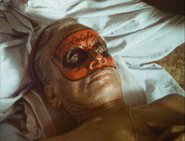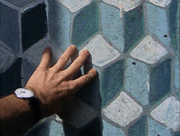Johan van der Keuken’s sublime and exhilarating riff on the city symphony and musical documentary, Brass Unbound is a thoughtful, infectiously engaging, and complexly resonant exposition on the transformative evolution of the ceremonial brass band throughout post-colonial societies from tools of enslavement and imperialism, to instruments of cultural celebration and personal expression. The film ingeniously […]
Tag: Dutch Cinema
The Mask, 1989
Set against the bicentennial commemoration of the French Revolution and the drafting of the Declaration of the Rights of Man, Johan van der Keuken’s The Mask is a relevant, provocative, and bracing exposition on the contemporary social representation of the ideals of the 1789 revolution – liberty, equality, and fraternity – at a particularly transformative […]
The Eye Above the Well, 1988
On the surface, photographer turned filmmaker Johan van der Keuken’s selection of an ancient Indian folktale narration that opens and concludes The Eye Above the Well is a curious one. Recounting the tale of a man suspended precariously from a tree branch above a snake-infested dried-up well who, in moments before an inescapable, horrific death, […]
I Love Dollar, 1986
Filmed in 1984-85 in an era of Reaganomics, a spiraling U.S. national debt, an unresolved energy crisis, a politically stabilizing Brazilian recession, and an unprecedented Asian high tech economic boom led by Hong Kong, Johan van der Keuken’s I Love Dollar is an ingeniously conceived, cohesively organic, and provocative exposition into the circulation and financial […]
The Way South, 1980-81
The coronation of Queen Beatrix on the eve of May Day in 1980 provides a salient point of departure for Johan van der Keuken’s The Way South, a cultural interrogation into the intertwined sociopolitical landscape of immigration, dislocation, underprivilege, and class division. Continuing on the prevailing theme of economic disparity between the continental north and […]
Springtime: Three Portraits, 1976
A muted, yet provocative composition on the changing face of the labor movement – or more appropriately, its immobility – in Western Europe in the 1970s, Johan van der Keuken’s Springtime: Three Portraits articulates the struggle of the working class under the protracted climate of an austere, stagnant global economy (stemming in part from the […]





